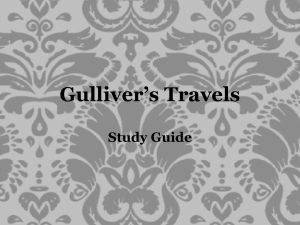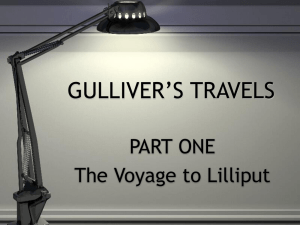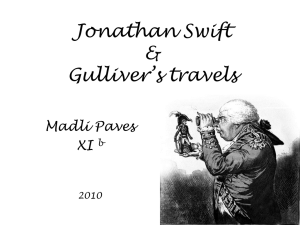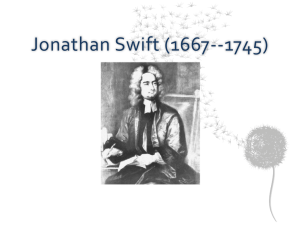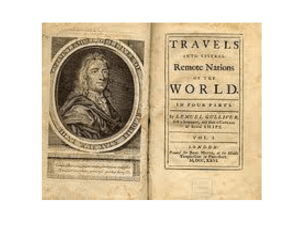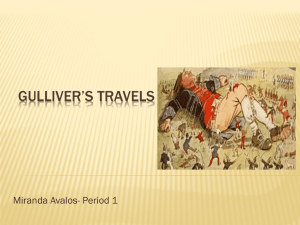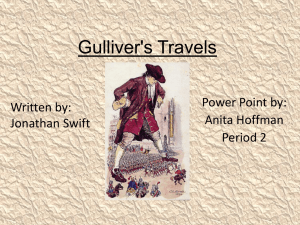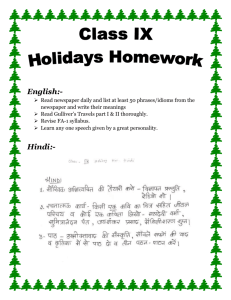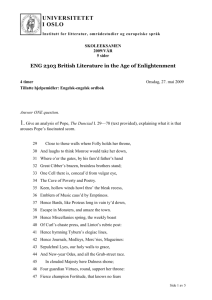GULLIVER`S TRAVELS ANSWER KEYS COMPREHENSION
advertisement
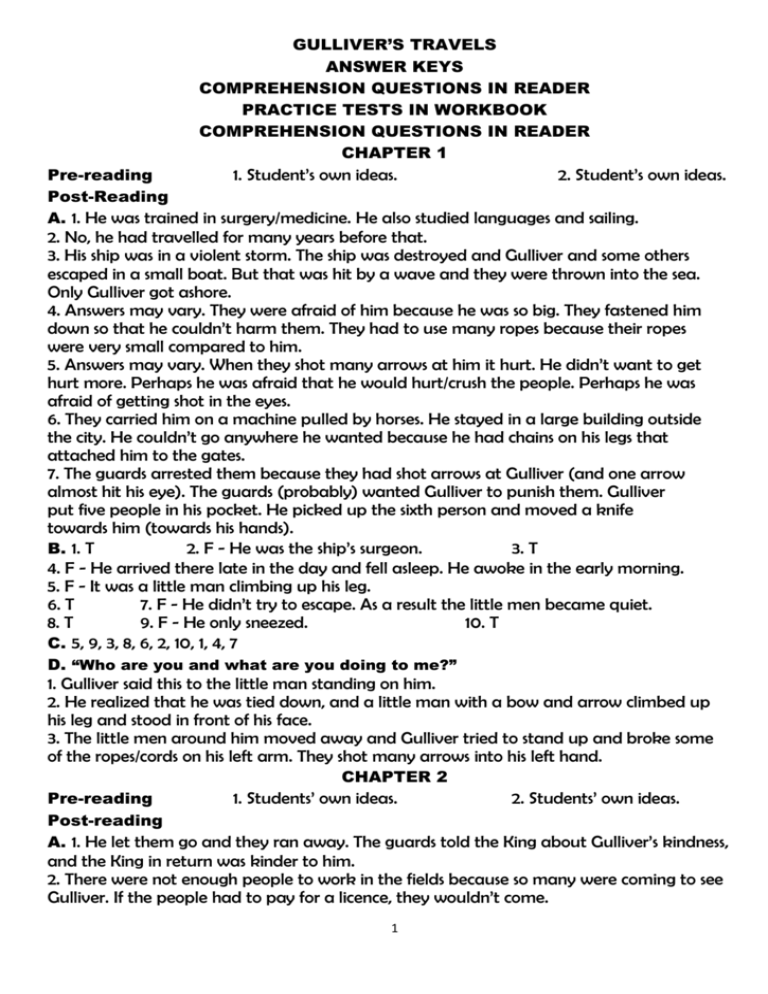
GULLIVER’S TRAVELS ANSWER KEYS COMPREHENSION QUESTIONS IN READER PRACTICE TESTS IN WORKBOOK COMPREHENSION QUESTIONS IN READER CHAPTER 1 Pre-reading 1. Student’s own ideas. 2. Student’s own ideas. Post-Reading A. 1. He was trained in surgery/medicine. He also studied languages and sailing. 2. No, he had travelled for many years before that. 3. His ship was in a violent storm. The ship was destroyed and Gulliver and some others escaped in a small boat. But that was hit by a wave and they were thrown into the sea. Only Gulliver got ashore. 4. Answers may vary. They were afraid of him because he was so big. They fastened him down so that he couldn’t harm them. They had to use many ropes because their ropes were very small compared to him. 5. Answers may vary. When they shot many arrows at him it hurt. He didn’t want to get hurt more. Perhaps he was afraid that he would hurt/crush the people. Perhaps he was afraid of getting shot in the eyes. 6. They carried him on a machine pulled by horses. He stayed in a large building outside the city. He couldn’t go anywhere he wanted because he had chains on his legs that attached him to the gates. 7. The guards arrested them because they had shot arrows at Gulliver (and one arrow almost hit his eye). The guards (probably) wanted Gulliver to punish them. Gulliver put five people in his pocket. He picked up the sixth person and moved a knife towards him (towards his hands). B. 1. T 2. F - He was the ship’s surgeon. 3. T 4. F - He arrived there late in the day and fell asleep. He awoke in the early morning. 5. F - It was a little man climbing up his leg. 6. T 7. F - He didn’t try to escape. As a result the little men became quiet. 8. T 9. F - He only sneezed. 10. T C. 5, 9, 3, 8, 6, 2, 10, 1, 4, 7 D. “Who are you and what are you doing to me?” 1. Gulliver said this to the little man standing on him. 2. He realized that he was tied down, and a little man with a bow and arrow climbed up his leg and stood in front of his face. 3. The little men around him moved away and Gulliver tried to stand up and broke some of the ropes/cords on his left arm. They shot many arrows into his left hand. CHAPTER 2 Pre-reading 1. Students’ own ideas. 2. Students’ own ideas. Post-reading A. 1. He let them go and they ran away. The guards told the King about Gulliver’s kindness, and the King in return was kinder to him. 2. There were not enough people to work in the fields because so many were coming to see Gulliver. If the people had to pay for a licence, they wouldn’t come. 1 3. It took a lot of food to feed him because he was so big. 4. Six of the King’s advisers were his teachers. 5. He told Gulliver to allow two soldiers to search his clothes for any weapons that might be a danger to him. 6. He said they would keep the things but return them to Gulliver or pay for them when he left their country. 7. He kept some things in a secret pocket. 8. The King was most interested in the sword, the guns, and the watch. The watch was the strangest to him. He didn’t understand what it was. 9. The King invited him to watch the best athletes and to see the King’s army. 10. An adviser called Skyresh Bolgolam did not want Gulliver to be free. He made Gulliver promise (1) not to enter the city unless he was asked; (2) not to step on any of the people of Lilliput; (3) to walk along roads and not lie down in any fields; (4) not to leave the country without a licence; (5) to fight for the King if there is ever a war with Blefuscu. 11. He told them to stay indoors so that Gulliver wouldn’t accidentally step on them. 12. Opinions may vary. Perhaps he wanted to show off his beautiful furniture and palace. He wanted Gulliver to think he was great because he had such a beautiful and expensive palace. 13. Reldresal was an important official who worked for the King. The King wanted him to explain about Lilliput’s problems and ask for Gulliver’s help against Blefuscu. 14. The main problem was a great argument between two political groups. The Tramecksan wore high heels because it was traditional. The Slamecksan wore low heels because it was modern. The two groups refused to talk to each other. The King belonged to the Slamecksan (low heels), which had more power. The Tramecksan (high heels) was bigger. 15. The main problem was the war with Blefuscu. There were rebellions because a previous King (the King’s grandfather) made a law that people must open an egg at the wide end, and people did not like this law. The people who took part in the rebellions ran away to Blefescu and were welcomed there. So this made a problem with Lilliput. 16. Opinions may vary. Students will probably say it was not a good law. Their suggestions for a solution will vary. They might just suggest that the law be cancelled. B. 1. F - They came to see Gulliver. 2. F - He did not allow them to see his secret pocket. 3. T 4. T 5. F - He only agreed after Gullver made some promises. 6. F - There were two. 7. F - People who opened an egg at the larger end would be punished. 8. F - The King belonged to the group who wore low heels. 9. T 10. T C. 1 - d 2 - f 3 - a 4 - b 5 - c D. “We are all pleased that you are now free, but you must understand that this is only because of the difficult situation in Lilliput.” 1. Reldresal/An important official who worked for the King. 2. There is a war with Blefuscu/another country and they are going to attack Lilluput. 3. He wants Gulliver to help Lilliput in its war. “I can see that you’re not a violent man, but this will take time and you need to be patient.” 1. The King. 2. Letting Gulliver go free. 3. He said Gulliver must allow some soldiers to search his clothes for weapons.GULLIVER’S CHAPTER 3 Pre-reading 2 1. Students’ own ideas. 2. The countries are at war because Belfuscu welcomes the rebels from Lilliput. Opinions will vary. It is perhaps wrong for one country to welcome rebels from another, but then again the law that the people are rebelling against is silly and shouldn’t exist. Post-reading A. 1. He walked/waded most of the way and swam where the water was deep. It was about 800 metres away. 2. He put chains on the ships and pulled them all to Lilliput. Students’ opinions may vary. Perhaps he didn’t destroy the ships so that the Lilliputians could use them. Perhaps he didn’t kill the sailors of Blefuscu because he was kind/merciful or because he thought the war was being fought for silly reasons and he didn’t want to hurt anyone. 3. The soldiers shot arrows at him. He put on his glasses to protect his eyes. 4. He brought the ships from Blefuscu so that the people of Blefuscu could not attack Lilliput. 5. The King’s opinion changed because the King wanted to attack Blefuscu and put his enemies in prison, including the rebellious people from Lilliput. But Gulliver refused to help him do this. 6. Opinions will vary. Some students might say he was wrong to break his promise. Some might say he had already defended Lilliput and defending was not the same as attacking. 7. The six officials came to ask how they could end the war peacefully. And they also asked to meet the enormous/giant man who had taken their ships. They invited Gulliver to visit their country. 8. The King’s adviser came to warn Gulliver that the King’s advisers wanted to punish him. Some of the advisers wanted to shoot him with poisonous arrows; some wanted to set fire to his house while he was inside; some wanted to not give him any more food. The King wanted to make him blind. 9. Flimnap said Gulliver was costing too much money. Skyresh had never liked him, and he said that Gulliver had not kept many of his promises. The navy man was angry because his job was no longer important because Blefuscu did not have a fleet of ships. 10. He didn’t want to hurt the ordinary people who lived in the city, and he remembered that the King had been kind to him before. He decided to leave Lilliput and go to Blefuscu. 11. Gulliver found a boat that was his size, but it needed repairs. The King of Lilliput wrote that Gulliver had escaped punishment and should be sent back to Lilliput. The King of Blefuscu refused to send him, but wrote that Gulliver would soon leave and not be a problem for either of them. B. 1. T 2. F - He treated him like a hero. 3. F - He refused to make them prisoners (and this is why the King became angry with him). 4. T 5. F - This was a lie that the King’s advisers said. 6. T 7. F - He told him what was planned for Gulliver, but he did not help him to escape. 8. T 9. F - He found a boat and repaired it. 10. T C. 1, 2, 5, 3, 4 D. 1-f 2-d 3-e 4-a 5-h 6-c 7-b E. “I can’t help you with these ambitions.” 3 1. Gulliver said this to the King of Lilliput. 2. The King wanted Gulliver to help fight against Blefuscu and put his enemies in prison. Gulliver refused to do this. 3. The King became angry with Gulliver and decided to punish him by making him blind and not feeding him. “I’m sorry. But at least I’ve told you what’s planned for you. It’s best if you’re prepared for what’s to come.” 1. An adviser of the King of Lilliput said this to Gulliver. 2. He said this one night when he visited Gulliver at his home. This was after there was a meeting with the King and his advisers about what to do with Gulliver. 3. The King’s men were going to make Gulliver blind and stop feeding him. “If you could help me find some materials, I’ll soon be able to leave.” 1. Gulliver said this to the King of Blefuscu. 2. He wanted to leave from Blefuscu and go to his own country. 3. He needed materials to repair a boat he had found (and to make sails and oars). He was going to leave in the boat. CHAPTER 4 Pre-reading 1. Students’ own ideas. Post-reading A. 1. They went to find fresh water. Gulliver walked away from the sailors to look around. The sailors left quickly because a giant was following/chasing them. They couldn’t wait for Gulliver. 2. The giants were very surpised. They seemed to think he was an animal at first until they heard him talking (although they could not understand him). 3. Gulliver was worried/afraid that the boy would not like him (and might try to hurt him again). 4. He walked up and down in front of the cat to show it that he was not afraid. He was intelligent / clever / cool-headed to act this way. (Students’ answers may vary.) 5. Perhaps because he knew that babies always put things in their mouth. He knew how to deal with a cat (show that he’s not afraid) and he could communicate by signs with the older giants, but he couldn’t do that with the baby. (Students’ answers may vary.) B. 1. T 2. F - He and others went there to get water. 4. F - They were farmers. 5. T 6. T 8. F - It was three times the size of a cow. 9. F - He was more afraid of the baby. 10. T 7. T 3. T C. 4, 6, 3, 10, 8, 2, 7, 5, 1, 9 D. “Enjoy this while you can. We need to prepare for a great storm.” 1. The captain of the ship/ The Adventure said this to Gulliver. 2. He had experienced conditions like that before. (It was the calm before the storm.) 3. Yes, he was. There was a great storm two days later and the ship was pushed so far east that they didn’t know where they were. 4 CHAPTER 5 Pre-reading 1. Students’ own ideas. 2. Students’ own ideas. Post-reading A. 1. He landed on a soft blanket that was held around the baby. 2. Two rats the size of large dogs attacked him. 3. She helped prepare a small bed for him. She sewed clothes for him and taught him their language. 4. The farmer’s friend (an old man) said this. He said it because he was angry that Gulliver laughed at him. Gulliver said “unfortunately” because the work was very hard. He had to perform for strangers many times in one day. Also the journey was uncomfortable. 5. He travelled around the country for ten weeks. 6. He had to perform many times a day for the people who came to see him. The farmer made him work a lot and didn’t realize how tiring it was for him. 7. He saw that Gulliver was losing weight and felt ill and tired. He thought Gulliver would die soon. 8. He didn’t like the farmer because he made Gulliver work very hard and only wanted to make money from him. But he liked Glumdalclitch because she took good care of him, and he asked the Queen to let her stay as his teacher. 9. He thought Gulliver was a toy. The King had had a very good education (and knew everything about mathematics and the history and geography of his land). He did not believe Gulliver’s story (because it did not agree with what the King already knew). B. 1. F - He hurt one and they both ran away. 2. T 3. F - He took him after several weeks. 4. F - They travelled by horse and Gulliver was in a box. (It felt like as if he were on a ship in a storm.) 5. T 6. T 7. F - Gulliver asked the Queen. 8. F - She was excited to have a job at the palace. 9. T 10. F - He didn’t trick her but the King thought he had. C. 1-f 2-d 3-a 4-e 5-b D. 3, 1, 5, 8, 4, 10, 2, 6, 9, 7 E. “Well if he’s so clever, you should make him work so that you can earn some money from him.” 1. The farmer’s friend/An old man said this to the farmer. 2. He is talking about Gulliver. The farmer will make people pay to see him. 3. Answers may vary. Students might say it was a good idea for the farmer because he made some money. It was not a good idea for Gulliver because it was uncomfortable and he had to perform a lot. After this the farmer got greedy and wanted to make more money, so he travelled around the country showing Gulliver to people. CHAPTER 6 Pre-reading 1. The King thought Gulliver was a toy. He could not believe what Gulliver told him about his life. He thought the farmer had tricked the Queen. 2. Students’ own ideas. Post-reading A. 1. The King could not believe that such a small person could live and that there could 5 be a whole country of such small people. But he asked the farmer, his daughter, and the Queen about Gulliver and decided that what he said was true. 2. The palace carpenter made him a home. It was the size of the box the farmer had used to carry Gulliver. It had a door and large windows. The walls were soft and the roof could be lifted up. 3. He ate with the Queen and her daughters and Glumdalclitch, and on Wednesdays the King joined them. 4. One servant dropped him into cream. Later he made apples fall off a tree onto Gulliver. A dog caught him in its mouth. He fell into a hole made by an animal. The insects were very large to him, and once some bees came into his house. A monkey carried him up to the top of the roof. 5. Answers may vary. Perhaps he wanted more privacy, some time to be alone with his thoughts. 6. There were mountains to the north and no one had ever crossed them. No one knew what was on the other side. There were no harbours, so no ships came from other lands. They got their fish from rivers and didn’t go out to sea. There were fifty-one cities. 7. It took him to the top of the roof of the palace. Then it left him there and ran away. B. 1. T 2. F - The King ate with them on Wednesdays. He usually ate with the Queen and her daughters and Glumdalclitch. 3. T 4. T 5. F - It has no harbours. 6. T 7. F - She had it made so he could enjoy himself (sailing in a lake in her garden). 8. T 9. F - It came into the room where his house was. 10. T C. 2, 3, 5, 1, 4, D. 1-g 2-e 3-a 4-b 5-d 6-f E. “I cannot believe that people who are so small can have houses and cities, clothes and jobs, rewards and prizes, arguments and fights!” 1. The King said this to one of his advisers. 2. He began to feel angry because the King was laughing at Gulliver’s country. 3. He realised that the King’s country was like Gulliver’s only much bigger. CHAPTER 7 Pre-reading 1. Students’ own ideas. 2. Students’ own ideas. Post-reading A. 1. A brave servant reached him from his ladder and carried him down in his pocket. The monkey was sent away from the palace. 2. The King thought the legal system was very weak and the government was very strange. He wanted to know why they had so many wars. 3. He asked about its legal system, where it got its money from, and why they had so many wars. 4. The King was horrified. He said he couldn’t believe that anyone would want such terrible things. He didn’t want to hear about them again. 5. The people never travelled outside the country. They didn’t need weapons. They didn’t have wars with other countries. They didn’t have many books. 6.The King of Brobdingnag was very learned. He was interested in science, history, geography , mathematics. But he was not interested in making weapons and he did not want wars. The King of Lilliput was interested in Gulliver’s weapons (he asked his advisers to study them) and 6 he wanted to go to war against Blefuscu. He wanted to be fashionable by wearing low heels. Students’ opinions of who is the better king will vary. They might say that the King of Lilliput wanted to fight for silly reasons. The King of Brobdingnag is educated, yet his country has few books. Is he really as educated as he thinks he is? 7. The King thinks his land is better because the people don’t want to make war. 8. Opinions will vary. Some might say he is treated well because he doesn’t have to work hard as he did for the farmer. Others might say he is treated like an animal in a cage and is not given his freedom or is not treated as a human being. 9. He climbed up a ladder to see the top of the page and then climbed down slowly to read the page. 10. The King said if a ship like Gulliver’s were found, its people would be brought to the capital so that Gulliver would have friends his own size. But Gulliver did not like the idea of more people being kept (like him in a box) to please the King and Queen. He wanted to talk with people who shared his ideas and to not have to worry about a giant stepping on him or a bird carrying him away. 11. He was in his box/house on the beach and a large bird carried it away and then dropped it in the sea. His escape was not planned. B. 1. F - A servant climbed up and got him. 2. T 3. F - He was horrified by the weapons. 4. T 5. T 6. F - It never did. (It didn’t even have contact with other countries.) 7. F - He said its people should be kept with Gulliver. 8. F - He asked to see the sea again. His escape was not planned. 9. T 10. T C. 1-e 2-d 3-a 4-f 5-b D. 4, 1, 3, 5, 9, 7, 6, 10, 2, 8 E. “I’ve always been very interested in science, but I cannot believe that anyone would want to have such terrible things.” 1. The King of Brobdingnag said this to Gulliver. 2. The “terrible things” are weapons that can easily kill people and destroy buildings. 3. Gulliver thought his country was small, unimportant and badly run. “You’re very lucky because you’ve escaped to a better place, where people want to grow food rather than make war.” 1. The King of Brobdingnag said this to Gulliver. 2. He began to think that it was small, unimportant, and badly run. 3. Students’ opinions will vary. CHAPTER 8 Pre-reading 1. Students’ own ideas. 2. It looks like a small house. It has a door and windows, and the roof can be lifted. The furniture is attached to the floor. Post-reading A. 1. He put a handkerchief on a pole and raised it through a small hole in the box. He waved the handkerchief and shouted. 2. A ship saw the box (which looked like a house) floating and sent a boat to see what it was. They tied ropes to it and pulled it back to the ship. They cut a hole in the roof for him to get out. 7 3. He didn’t realize that they were the same size as him. He thought they were giants who could lift the roof easily. They laughed because they thought he was joking or mad to suggest such a thing. 4. He had been living with giants for two years and he was not used to seeing people his own size. 5. The box was the size of a small house and it was very heavy for the ship to carry. 6. The captain thought he might be a criminal and had been put in the box as a punishment. He wanted to take him to the nearest port and leave him there. 7. He wanted to ask if he could buy some sea biscuits because his ship was low on food. 8. They came back and said there was a house floating on the sea. He did not believe them. 9. A comb made from a dried leaf, the sting of a bee that was the size of a knife, some pins and needles the size of swords, a ring that was big enough to wear on his head, trousers made from the hair of a mouse, a tooth that was thirty centimetres long. 10. He is used to talking loudly to the giants. He had to talk very loud to them because their heads were so far away. It was like shouting out of a window to someone in the street two floors below. 11. He felt safe there. (After his adventures he doesn’t want to risk ending up in any strange lands again.) B. 1. T 2. T 3. F- There were no windows on that side of the house and he couldn’t see what was happening. 4. T 5. F - Someone called in English. 6. F - He thought they were giants. 7. F - The carpenter cut a hole in the roof and put a ladder down. 8. T 9. F - He thought at first that Gulliver was mad. 10. T C. 7, 5, 3, 1, 4, 10, 6, 8, 2, 9 D. “That’s not necessary. Just ask one of your sailors to pick up the box and carry it onto your ship, where you can lift up the roof.” 1. Gulliver said this to a sailor. Gulliver was still in his house/box, which was lifted out of the water and tied behind the ship. 2. He (and others) laughed. They thought Gulliver was joking or mad because the house was too big for a person to lift up alone or to open the roof. 3. Gulliver said this because he didn’t realise that the sailors were the same size as he was and that the box/house was enormous to them. “The sailors said this was very difficult and they’d only raised it a little when I saw your handkerchief appear through the hole in the side. We realised that someone or something was locked inside the box.” 1. The captain (Thomas Wilcocks) said this to Gulliver. 2. Lifting the house/box to the ship. 3. When the captain was talking with Gulliver later and saying how they had seen his box / house and brought it to the ship. GENERAL QUESTIONS 1. The author is Jonathan Swift. 2. The setting is England in the late 1600s and early 1700s / late 17th century and early 18th century. 3. He wanted to travel. 4. He was a surgeon and he wasn’t always needed. He used his free time reading and learning languages. 8 5. The land of the little people was called Lilliput. Students’ opinions as to whether this is a good name. (It perhaps sounds like the beginning of “little”.) 6. Students’ opinions. 7. Students’ opinions. There are several examples of kind acts he does, but you might ask students what they think about Gulliver leaving his family. 8. He could speak English, French, Spanish, Chinese and Arabic. 9. He did this because people were leaving their work on the farms to go and see Gulliver. There were not enough people to work in the fields. 10. He began to speak it quite well after three weeks. 11. The King wanted to show how big his army was and how well his soldiers could ride. 12. Any three of these: (1) He must not enter the city unless he is asked. (2) He must not step on any of the people or pick them up without their permission. (3) He must walk along roads and not lie down in fields (so he doesn’t damage crops). (4) He must not leave the country without permission. (5) He must fight for the King if there is a war with Blefuscu. 13. He did this to protect the people so Gulliver wouldn’t step on them. 14. The Tramecksan thought that people should wear high heels because this was the tradition. The Slamecksan thought that people should wear low heels because this was more modern. 15. They were rebelling against a law that said they must break a boiled egg at the narrow end. 16. Blefuscu welcomed the rebels from Lilliput, so Lilliput fought Blefuscu. 17. Students’ opinions. They should present examples from the book. 18. He bent the poles into hooks and tied the hooks to ropes. Then he attached the hooks to the ships of Blefuscu and pulled the ships to Lilliput. 19. Because Gulliver was not interested in putting innocent free people into prison. This tells us that Gulliver is a fair and honest man who does not like to hurt other people. (Answers may vary.) 20. When the King of Lilliput gave Gulliver the freedom to do as he wished with the people of Lilliput who had attacked him, Gulliver untied their hands and set them free. Later he shows kindness to the people of Blefuscu when he refuses to help the King of Lilliput attack and imprison the free people of Blefuscu. (Answers may vary.) 21. The King punished Gulliver by taking away the honor of being the hero of Lilliput. This shows that the King is not a fair ruler and that he is only interested in achieving power. No, he is not a good man. A good man should be fair and should only attack other people in selfdefence if he finds himself in serious danger. (Answers may vary.) 22. Flimnap was angry with Gulliver because he was costing the country too much money. Skyresh Bolgolam was angry because he believed that Gulliver had not kept many of his promises he had made when they set him free. The navy officer was angry because now that Gulliver had destroyed Blefuscu’s fleet, his job in the navy was no longer important. 23. Gulliver didn’t want to fight back because he remembered how kind the King had been to him when he first arrived. Also, Gulliver did not want to hurt the ordinary people of Lilliput, who were not to blame for the King’s decisions. So instead, Gulliver decided to escape peacefully. 24. He planned to repair it and use it to return to England. 25. John Biddel finally believed Gulliver when he saw the tiny cows and sheep that he had in his pocket and the tiny painting he had hidden in his glove. 26. He got the money from selling the tiny animals. 9 27. Gulliver had these thoughts when we he was trapped in a field in the land of the giants, and was nearly killed by the giant farmers. Students’ opinions. Suggested answer: Yes I agree, because everything is relative. A baby sees his father as a giant, while an elephant sees the father as a tiny human. This is probably more true among animals than among humans, who eventually grow up and all become the same size. 28. She called him Grildrig, which means “puppet”. 29. He welcomed people when they entered the inn and when up and down when he was asked to do so. Also, when Glumdalclitch asked him specific questions, he answered them. 30. He asked to keep Glumdalclitch as his teacher. 31. Because he had bad feelings towards the farmer, who had overworked him and used him to make money. 32. Answers may vary. Suggested answer: Yes, because he treated Gulliver according to how much money Gulliver could make for him. He never cared for Gulliver or for his needs. He only cared about making money for himself. 33. He shoved him down the hole of a meat bone, and he made apples fall on him in the garden. 34. Because there are high mountains on the north side, and the seas around the other sides are very rough and it isn’t safe for boats to go travelling into the sea. 35. Gulliver began to see his country through the eyes of the King, who was very critical of the weapons England had and the many wars it fought. 36. Suggested answer: Seeing the practices and traditions of other countries might make someone question their own practices and traditions. They might think their country is better or worse. They might get ideas that they can adapt for their own country. 37. Because the King believed that Gulliver had escaped to a better place, where there were no weapons or wars. 38. The noise from the concert was extremely loud, so it sounded like thunder. He solved this problem when his box was moved to a room at a far corner in the palace, with the doors and windows closed. Gulliver liked the music. 39. The servant left him to go to search for birds’ eggs on the beach. 40. To prove to him that he was indeed near a land that belonged to enormous people and that it was an enormous bird that had carried his box to sea. 41. Suggested answer: Gulliver no longer wanted adventures. He had become more careful and mature and was now more interested in settling down with his family. 42. He had gotten used to people being very big, and he was afraid he would step on the people of his country, whom he felt looked very small. The English people thought Gulliver was being rude to them. 43. Gulliver told her that she hadn’t fed the children enough and they were too small. He found it strange to have to look down to them because he was used to looking up at people to talk to them. She thought his long journey at sea had made him mad. 44. Students’ own answers. 45. Students’ own answers. PRACTICE TESTS FIRST TERM PRACTICE TEST ONE a. 1. He was born (on a farm) in the middle of England. 2. He had four brothers. 3. Mr Bates taught him to be a surgeon. 10 4. He wanted to travel and explore the world. b. 1. Gulliver’s wife Mary said this. 2. It was said to Gulliver. 3. (Students’ own answers) c. 1. When Gulliver had finished his studies, he went to work as a surgeon on a ship called The Swallow. 2. Gulliver reached a country called Lilliput after The Antelope sank. PRACTICE TEST 2 a. 1. They fit together 600 of their beds. 2. The rule said that no one could see him without a licence. 3. Six of the King’s advisers were assigned to teach Gulliver the language. 4. The King didn’t understand what it was or why it made a continuous noise. b. 1. He says this to one of the men who had shot arrows at him. 2. Suggested answer: He is trying to tell them and the King that he wants to be free. (Answers may vary) 3. Gulliver’s situation improves and the King has a bed made for him. c. 1. In Lilliput, people who opened an egg at the larger end would be punished. 2. People who took part in rebellions at Lilliput always ran away to Blefuscu, where they were welcomed. PRACTICE TEST 3 a. 1. His plan is to take their ships so that Blefuscu can’t attack. 2. The King gives Gulliver the most important medal. 3. They want to end the war peacefully and they want to see Gulliver. 4. They thank him for not hurting any of their people. b. 1. Gulliver says this. 2. It is said to the King of Lilliput. 3. The ambitions are to attack Blefuscu and put its people (and the rebels from Lilliput) in prison. c. 1. Since the King of Lilliput did not want to kill Gulliver, it was agreed that Gulliver would not be given any food. 2. Before leaving Blefuscu, Gulliver was given a painting of the King by the King of Blefuscu. SECOND TERM PRACTICE TEST 4 a. 1. He had experience with those weather conditions. (He knew it was the calm before a storm.) 2. A giant was coming after them. 3. They were looking for drinking water. 4. He walked up and down in front of the cat to show that he was not afraid of it. b. 1. He said this to the farmer. 11 2. He gave the money back but he did keep Gulliver safe. 3. He took him home and showed him to his family and took care of him. c. 1. The Adventure stopped in (the south of) Africa for water and repairs. 2. Of all the giants, the baby was the one that Gulliver feared the most. PRACTICE TEST 5 a. 1. He landed in a soft blanket that was around the baby. 2. They made sure he wasn’t hurt and they let him rest on their bed. 3. Suggested answer: Yes, the bed made him think of his wife, and he felt very small and lonely on the big bed with no one around him. 4. He used his knife to defend himself. b. 1. Glumdalclitch / The farmer’s daughter said this. 2. It was said to her father, the farmer. 3. Answers may vary. These words show that she cared about him and didn’t want him to be hurt. / These words show that she was jealous of him and thought of him as a toy that she didn’t want to share with others. c. 1. Grildrig was the name given to Gulliver. / Glumdalclitch was the name given to the farmer’s daughter. 2. The Queen bought Gulliver from the farmer. PRACTICE TEST 6 a. 1. The walls were soft so he wouldn’t be hurt when someone carried the house. 2. It was important so he could prevent any rats or insects from entering. 3. He thought she would lose it because it was so small to her. 4. She made him wash all the cream from Gulliver’s clothes. b. 1. The King of Brobdingnag said this. 2. It was said to Gulliver. 3. They said it was impossible for there to be a land full of such small people (who lived and ate as easily as the giants did in their own country). c. 1. A monkey carried Gulliver up onto the roof of the palace. 2. Gulliver’s key was the smallest thing ever made in the palace. 12
